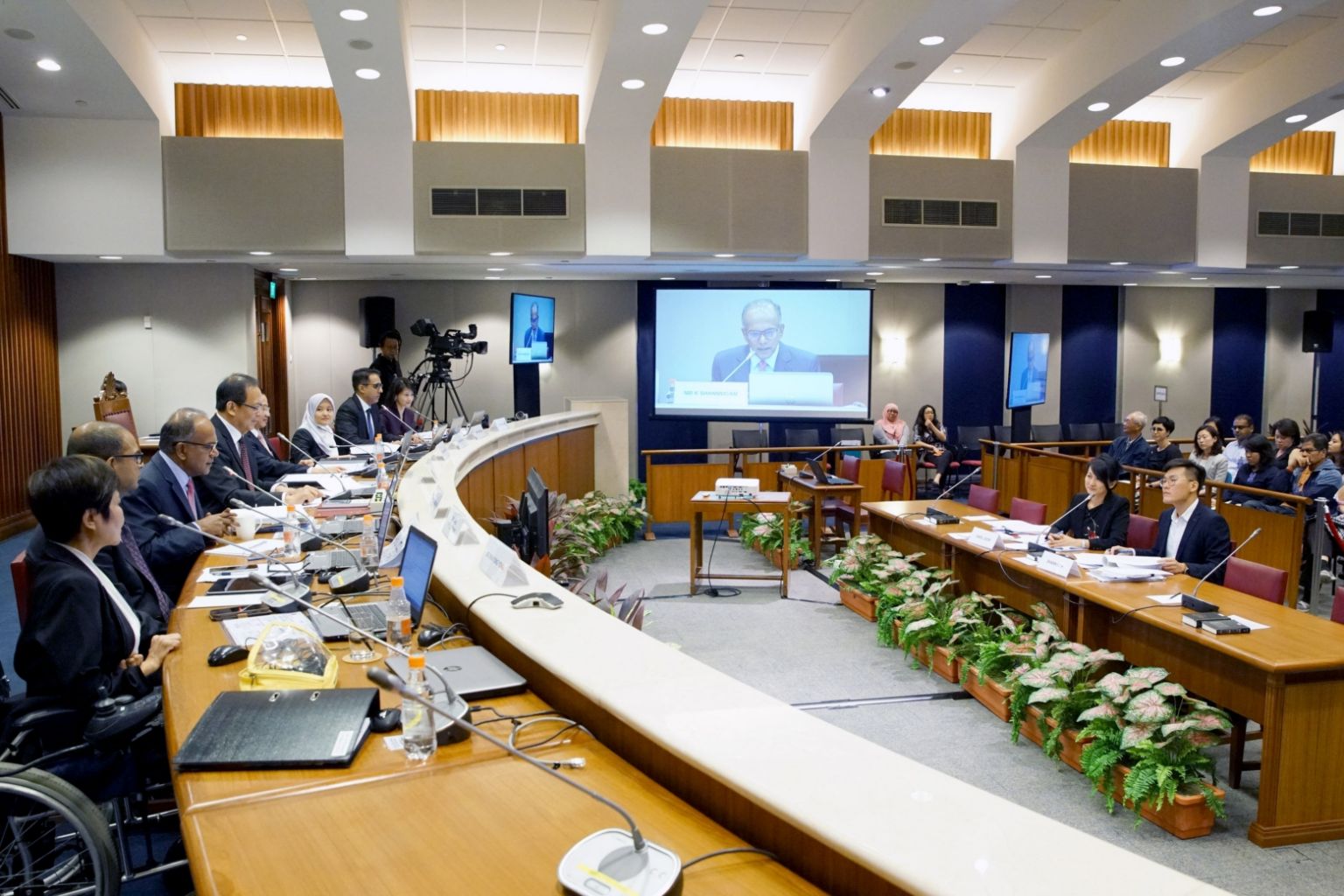Recap of what Select Committee on fake news did and key issues that emerged during hearings
Sign up now: Get ST's newsletters delivered to your inbox

Chaired by Deputy Speaker Charles Chong (fourth from left), the Select Committee comprises seven MPs from the ruling People's Action Party, one member from the Workers' Party and one Nominated MP.
PHOTO: MCI
SINGAPORE - A Select Committee set up to study the issue of deliberate online falsehoods - fake news - submitted a report on its findings to Parliament on Wednesday (Sept 19).
This marks the conclusion of its work, which began at the start of the year.
What has the Select Committee done so far?
The committee was appointed in January. Chaired by Deputy Speaker Charles Chong, it comprises seven MPs from the ruling People's Action Party, one member from the opposition Workers' Party and one Nominated MP.
It then invited members of the public to submit their thoughts on the causes and consequences of deliberate online falsehoods and suggest countermeasures against the threat.
It received 170 submissions in all.
After considering the submissions, the committee invited 79 individuals and representatives of organisations to elaborate on their submissions during public hearings.
Of these, 65 showed up and spoke at the hearings, which took place over eight days in March.
They included representatives from technology giants Facebook and Google, academics such as Dr Cherian George, professor of media studies at the journalism department of Hong Kong Baptist University; Dr Lim Sun Sun, communication and technology professor at the Singapore University of Technology and Design; and Dr Carol Soon, senior research fellow at the Institute of Policy Studies.
They also included activists and representatives of non-profit organisations, such as political activist Jolovan Wham, freelance journalist Kirsten Han and members of the inter-faith group Roses of Peace.
The major issues discussed during the hearings include:
1. The definition of deliberate online falsehoods
During the exchanges, the Select Committee members gave a hint of what factors could be considered in defining it: The deliberate intent of the person or organisation spreading the information; that it appears on an online platform; that it is demonstrably false; and has a significant impact, such as affecting national security or racial and religious harmony.
Many speakers stressed that this was important - any new laws to counter deliberate online falsehoods must be clear in their definitions to avoid catching people who make honest mistakes.
2. Whether there is a need for new legislation
Several committee members said during the hearings that they personally felt new laws were necessary to tackle the problem of deliberate online falsehoods.
Many recommendations at the hearings involved some kind of mechanism that can quickly remove or prevent access to online falsehoods, whether by blocking them or compelling people or technology platforms such as Facebook and Twitter to remove the illegal content.
Some who supported the idea of a new law said it should be carefully calibrated, so that it is not too sweeping and broad, and does not punish those who inadvertently share falsehoods or crimp the ability of journalists to do their job.
Dr George, for example, cautioned that legislation which prohibits the wounding of feelings may be used as a weapon instead by the most intolerant groups against moderates.
Similar worries of a "backfire effect" were echoed by Ms Han, who said that people may see the removal of a social media post as oppression and censorship, causing a situation to become more inflamed.
3. Regulation of tech companies
The committee also spoke to tech companies and media experts about regulating tech companies such as Facebook and Twitter, which have become very dominant forums carrying a great deal of citizen discourse.
Potential rules suggested included forcing tech firms to take more active steps in fighting fake news, such as flagging disputed content, strengthening their detection of falsehoods, de-prioritising unreliable online news sources and removing fake accounts.
4. Having a fact-checking mechanism
This was a popular suggestion at the Select Committee hearings. Ideas included having a fact-checking service, setting up independent fact-checking organisations or supporting fact-checking networks online.
Singapore Press Holdings and broadcaster Channel NewsAsia (CNA) said they were willing to form a fact-checking alliance, which could include not only media companies and industry practitioners, but also other interested parties.
5. Improving media literacy
Including media literacy as part of a multi-pronged approach to counter the spread of online falsehoods was a call made by academics, students and civil society alike.
Many agreed that the fostering of such literacy, and reminding the public against sharing information without checks, could form long-term measures to counter disinformation.
6. Online falsehoods as a national security threat
Several speakers during the hearings warned that Singapore is particularly vulnerable to the problem of deliberate online falsehoods, which capitalise on existing fault lines in society.
Disinformation can also be used instead to intrude on another nation's sovereignty, they noted.
In fact, Dr Gulizar Haciyakupoglu of the S. Rajaratnam School of International Studies told the Select Committee that there were already signs of an information warfare against Singapore under way, with an unnamed country trying to influence minds and legitimise its actions by putting out its narrative through news articles and social media.


